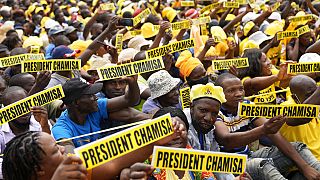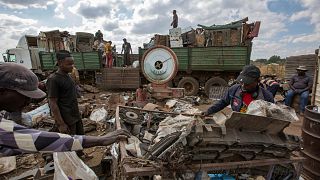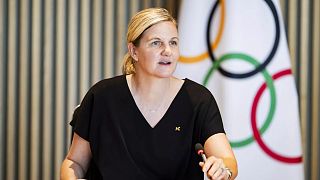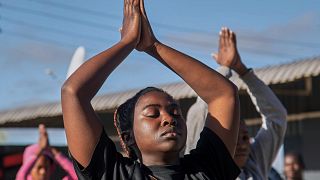Zimbabwe
Tucked in a corner of a dimly-lit hallway of a rundown block of flats in Zimbabwe's Mbare township, a few drug users desperate for recovery prayed and encouraged each other to reduce their habits.
They passed around a plate of cookies.
Among those in the support group Is Adrias Chidemba, 28, who used to sell fruit and vegetables on Harare's streets and was saving to set up a small kiosk.
But then COVID-19 hit and the months-long lockdown shattered his dreams.
He said he took to drugs and alcohol to "numb the stress" and that his parents "took me as a madman and kicked me out of the house".
The pandemic has contributed to a mental health crisis in Zimbabwe driven by substance abuse, say health professionals.
Authorities and campaigners attribute it to loss of employment, prolonged school closures and anxiety resulting from COVID-19.
At Sally Mugabe Hospital, one of the country's biggest, the majority of people passing through the psychiatric unit are substance users, said Nelson Makore, the unit's senior nursing officer.
In 2019, the hospital attended to 150 substance abuse cases. That number spiked to 825 in 2020, he said.
Zimbabwean health professionals are familiar with problems from marijuana use but now see more people turning to harder drugs such as heroin, cocaine and crystal methamphetamine, said Makore.
Kudakwashe Madzima, leader of the Mbare township chapter of the Zimbabwe Civil Liberties and Drug Network, says the group is a last hope for many.
Even as their meeting was underway in Mbare, some other youths puffed marijuana nearby.
At Tirivanhu Therapeutic Center, a mental health rehabilitation center about 25 kilometers (15 miles) southeast of the capital, Harare, people fortunate enough to find a place there work in the garden, a tree nursery and with livestock before engaging in counseling and sporting sessions in the afternoon.
Offices have been converted into an accommodation wing due to increasing demand, said Timothy Sithole, a programs officer with the Zimbabwe National Association for Mental Health, which runs the home.
"It's really sad," he said. "We have a capacity of only 17 people at a time.... So there is a backlog of people, a long list of people who are willing to have their relatives admitted here so that they can be rehabilitated," he added.
The center charges $30 a month but also takes in some "really desperate cases" for free and receives some government support.
Some private centers can charge between 10 to 20 times more, making them unaffordable to many, said Sithole.
Some who fail to get support end up roaming the streets, he said.











Go to video
What to know about the COVID variant that may cause 'razor blade' sore throats
Go to video
WHO approves landmark pandemic agreement to improve response in event of future pandemic
Go to video
Nigeria completes $3.4 Billion IMF COVID-19 loan repayment, faces ongoing annual charges
01:02
WHO member countries draft landmark preparedness treaty for next pandemic
Go to video
Mauritius: Ex-finance minister released on bail after corruption charges
01:02
First payments made to white farmers affected by land reforms in Zimbabwe